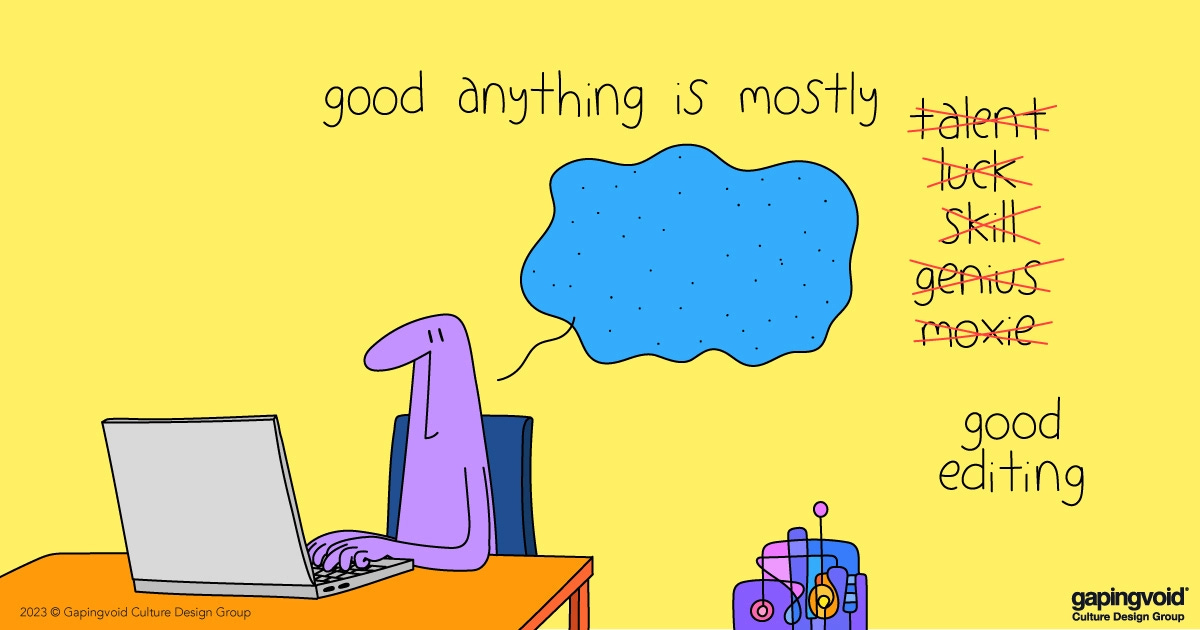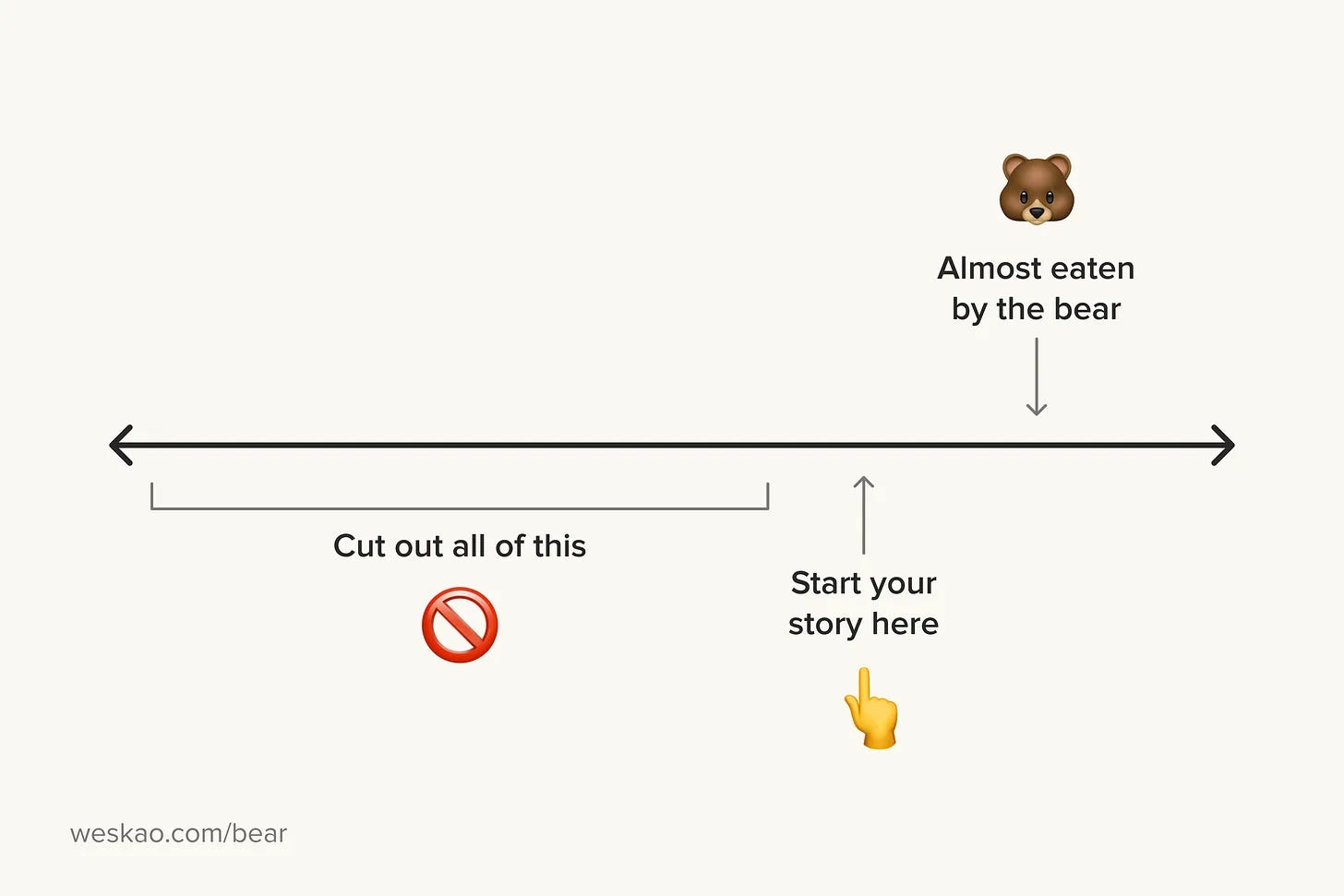Dare to Disagree: The Importance of Having a Spiky Point of View, How To Find It, and Building the Courage to Share It 🌵
Your "spiky point of view" is an overlooked secret to success. But do you know how to uncover, express, and develop the courage to share yours? Here's a complete guide to the SPOV.
Most people equate cancer with death. The truth is, also, cancer is love. A Dana Farber nurse told me this as my wife was getting chemotherapy just before she died at the age of 42. Our kids, Jack and Ruby, were 6 and 4. The nurse was right. Among the deluge of doctors, needles, and surgeries, Ruby loved watching I Love Lucy with her Momoo in the hospital bed. Lime green cafeteria jello made dinner colorful and jiggly. Our art therapist, Jen, taught me how to talk to little kids about death. I’ve shared her wisdom with other parents for fifteen-plus years.
I wish more people noticed love riding shotgun with tragedy. The ancients did. In biblical Greek, “apocalypse” means “an uncovering.” They’re right: my cancer apocalypse uncovered good memories, remarkable kindness, and deep love.
Cancer sucks, but also, cancer is love. This idea surprises many people, and I enjoy sharing it. It’s an idea that has motivated folks to subscribe to my Substack or attend my course, and I donate 100% of those proceeds to a cancer hospice.
Your Spiky Point of View: What Makes You Unique
What wrong should be right? What insight do most overlook? What inspirational water do you want to splash in my face? Your answer is what Maven cofounder
calls your “Spiky Point of View,” or SPOV.1 Finding your SPOV might be the most important thing you do for yourself, your mission, and others.A Spiky Point of View (SPOV) is your truth. It pierces boring like a cactus thorn🌵. A SPOV is true to you, yet debatable. Sometimes, they’re inconvenient. Good SPOVs are provocative, memorable, and generous in spirit.
A great SPOV can inspire others, change minds, and motivate action. It drags your ass out of bed in the morning. Muhammed Ali knew he was the greatest. Miles Davis made Jazz “cool.” Steve Jobs saw the iPhone as a bicycle for the mind. Their SPOVs drove them to turn their vision into reality.
Here’s how to find, refine, and share your SPOV.
How to Find Your SPOV
To find your spiky point of view, listen. Be quiet. Meditate. Journal.
As you do, reflect on this: “What do most people think that, actually, isn’t true?”
Write that down, like this:

This simple template is tough to use. Often, your first attempt will come out like this:
“Our educational system is broken and needs to be fixed.”
“Do what you love, and the money will follow.”
“Taylor Swift is a genius.”
Close, but no cigar! These are middle-of-the-road, heard-it-before stances on common topics. Most agree education should be fixed; the hard part is how? Most people know they should do what they love, but how do you find it? Lots of people love Taylor Swift.
But that’s OK, let’s sharpen one of these points of view. Take Taylor Swift. For me, her collaboration with Jack Antonoff is her most innovative. 100 years from now, I believe it will be her most lasting work, because:
Evermore, Folklore, and Midnights are my favorite Swift albums by far. All three were predominantly produced by Antonoff.
Of Swift’s ten studio albums, Billboard ranked the Antonoff-produced albums #1, #3, and #5.
Antonoff is an unheralded genius. Many don’t realize that he was a founding member of Fun, the American band that won Grammies for Best New Artist and Song of the Year for "We Are Young" in 2013.
It has all the elements of a good SPOV:
It’s bold. If most people agree with you, your POV isn’t spiky enough. Get out of the middle of the road. Take a stance. Add sauce. Show conviction. My SPOV on Taylor Swift is even spiky to Swifties!
It’s debatable. A good SPOV will invite others to disagree and debate you. The Billboard list and Grammies are strong evidence of the quality of the Swift / Antonoff partnership. However, good arguments can be made that other albums were better in various ways. Good — let’s learn from each other!
It’s generous. The goal of a SPOV is to help people. You aim for a response like: “Hmm, I hadn’t thought about it that way. This makes me rethink things. Thank you.” In the case of Swift, my goal is to introduce music fans to some of her less popular albums.
It’s carefully crafted. It’s hard work to create a good SPOV. Use stories, metaphors, vivid words, and surprising data to convince others.
It’s full of fun, memorable, or surprising facts. Most are surprised to find that Billboard ranked Evermore as Taylor’s #1 album. Debating the “top 10” of anything is fun. The connection between Taylor and Fun is fun.
Its not easy to craft a good SPOV. Let’s explore how to do it.

How to Craft Your SPOV: The Art of Storytelling
A good SPOV is a short story, and anyone can tell a good story about something they hold dear.
Unfortunately, 94% of us are ghastly storytellers. How do I know? I analyzed 250 posts in my LinkedIn feed. Only 6% were thoughtful, helpful, or seemed “spiky” to me. I don’t think this is because storytelling is hard; it’s because storytelling is a skill. Most of us haven’t been schooled in the art of storytelling.
So, study storytelling. Join Toastmasters. Study TED speakers, Steve Jobs, and Nancy Duarte. Learn to use humor. Read my article, Storytelling Skills for Leaders. It’s not rocket science; we tell stories all the time. Do a little studying. Write down your story and ask an AI tool like Perplexity to improve it.
So, once you uncover your point of view, put in the work. Describe how you discovered your point of view. Search for facts, awards, statistics, anecdotes, and famous quotes to support your opinion. Edit, edit, edit.
Then, practice.
Practice in safe surroundings with friends first. Eventually, share them publicly on a blog. Steel yourself to criticism; don’t grasp for compliments.
As Hugh at Gapingvoid says, good anything isn’t mostly talent, luck, skill, genius, or moxie; it’s good editing. It’s hard work.
The Fear of Sharing Your Spikey Point of View
In her outstanding TED Talk, Dare to Disagree, former CEO, author, and Thinkers50 Hall of Fame inductee Margaret Hefferan explained that 85% of American and European executives have issues or concerns they’re afraid to raise.
85% is a really big number. 85% are afraid of conflict. 85% are afraid to get embroiled in arguments they can’t manage. 85% are afraid to lose.
But I don’t believe it.
My SPOV about SPOVs is that although most people don’t dare to disagree, the truth is that anyone can do it. Fear is the obstacle, but hard work is how you hurdle it. So, simply put in the work to write your SPOV, practice it, and your confidence will rise.
SPOV Inspiration: By Me, By Art, By Wes, By AI
Want some SPOV inspiration? Here are some of mine:
Most people are ghastly storytellers, but the truth is, anyone can be a good one
Most companies should be decision-driven, not data-driven
Most data analysts think math is more important than creativity; it’s not
Most people fear AI, but it will create more, better jobs than it takes away
Most people think AI is job automation. It’s not, it’s about creativity
Most CMOs get marketing wrong (DM me for this SPOV: coming soon)
Most leaders don’t set OKRs right (DM me for this SPOV: it’s coming soon)
Most people view cancer as death, but if you look for it, cancer is love
Another place to find SPOV inspiration is art. Great art isn’t about colors, sounds, or images; it’s about ideas. So, as you read your favorite books, listen to music that moves you, or ponder art you love, ask: What is this artist trying to say?
My SPOV inspiration comes from Wes Kao, who originated the term. Her Substack has over 200,000 followers. Try reading her SPOV on giving “Super Specific” feedback at work or how to uncover the question behind the question. Or read her writing advice: most people set too much context, but actually, you should start your story right before you get eaten by the bear:
Another great way to hone your SPOV is to use AI. Once you have a draft, copy and paste it into AI with one of these prompts:
Argue why <your draft SPOV> is true.
Argue why <your draft SPOV> is untrue.
Rewrite <your draft SPOV> with an ironic twist.
Explain <your draft SPOV> in the voice of <your favorite thinker, like Einstein>
Generative AI is a great collaborator. Use it to punch holes and ponder alternative points of view. Read what AI says, then sharpen your spike.
Go Forth and Be Spiky
Finding, crafting, and sharing your Spiky Point of View is the secret to great work. It turns good essays into great essays, average presentations into a call to action, and safe decisions into game-changing moves.
Everyone needs a SPOV: CEOs, data analysts, marketing professionals, doctors, entrepreneurs, investors, lawyers, and teachers — it’s what makes you unique. Use Wes Kao’s template. Use AI. Put in the work. Most of all, have fun.
Go forth. Be spiky!
LinkedIn recently named me a “Top Voice in Data Analytics.” They ask me to answer questions in less than 750 characters, and I love the challenge of writing rapid-fire, quick-hitting answers. I liked this one. Follow me on LinkedIn to read more “Top Voice” posts.
And check out these other Substacks I love:
by ~ of ~ ~ by ~ by ~ by ~ by ~ by and the work of advertising firm of and from PJA.Finally, subscribe to
— I share my SPOVs for free and donate 100% of paid subscriptions to charity to spread my SPOV that cancer is love.The term “Spiky Point of View” comes from Maven founder Wes Kao’s essay. Spiky point of view: Let’s get a little controversial








I’m excited to read the marketing spov! Also I clicked into your LinkedIn profile and was reminded of your Time Magazine honor. That then reminded me of when we put your picture on the cover for the StreamBase office poster. And that reminded me that I had a dream not long ago about you being on the cover. In my dream a friend was on the cover and I told him how I knew someone else that had been on the cover. I wish I could tell you why I had been dreaming about people being on the cover of TIME but I can’t 😂
I also use this when interviewing people for senior jobs, or suppliers for expert roles.
“What have you come to believe about <topic> that other people in your field would disagree with you on?”
Anyone that is thoughtful and has genuine experience will have much to say. People that are new to the game and only know it in theory have nothing to say